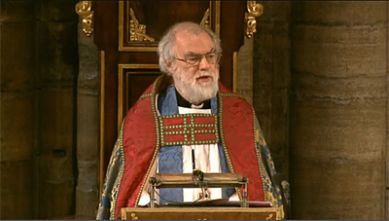Archbishop of Canterbury Honors UK WWI Veterans

The Archbishop of Canterbury Rowan Williams gave a message on Armistice Day 2009 marking the passing of the last UK veterans of World War I, as well as the passing of the generation that they were a part of.
Calling the war, "A huge collective bereavement," Williams began by detailing the sufferings and aftermath faced by those affected by the world conflict.
"The generation that lived through the War was a generation both literally depleted by mass slaughter and depleted or diminished in another way by the loss of so much confidence and aspiration," Williams said. "All around were the signs of absent contemporaries; and for many, the continuing trauma of having seen friends butchered hideously in huge numbers in front of their eyes. There were absent sons and daughters, parents, brothers and sisters, husbands and wives, lovers, colleagues, neighbours: a routine intensity of loss."
"But beyond that, many believed that the greatest loss in the war was the conviction of human purpose and human meaning...an automatic belief in national righteousness, governmental wisdom, the trustworthiness of official communication and popular media alike – all these were shaken apparently beyond repair," Williams continued. "The generation that discovered this had to find their way forward into the twentieth century with maps and landmarks damaged almost unrecognisably."
In spite of the suffering, however, significant achievements were made by the war generation, who pressed on with "a depth of vision and courage that still arrests us," according to Williams.
"The century that this generation lived through was a century of renewed awareness of poverty and injustice in Britain, of recklessly brave resistance to tyranny and bigotry in another war, of the struggle to build what we might now call a sustainable society in the wake of that war - through the Welfare State in Britain and through new patterns of political stability and co-operation in Europe," the Archbishop said. "On the world stage, it was the generation that transformed Empire into Commonwealth."
"It is a story of some real heroism – the survivors of one massive military slaughter becoming, so often, the civilian heroes (and in some cases the victims) of other great struggles," he continued.
Commenting on how the war shaped the faith of those affected, Williams said that it moved Christians from believing in a "bland problem-solving God" to a "God who is discovered in the heart of your own endurance and pain."
"Not a solution, not a Father Christmas or a fairy godmother, but simply the one who holds your deepest self and makes it possible for you to look out on the world without loathing and despair," he said.
Tragically though, such faith was short lived against the "rising tide scepticism and the sense of the absence of value and meaning throughout the century," Williams continued, the effects of which believers continue to battle through disciplines of prayer and other means.
"In the darkest places, you discover you are real to yourself and one another," he said. "And if you're not called – mercifully – to such places, you will need disciplines of thinking and imagination to keep yourself real: to fight off easy answers, false gods, stifling systems."
"Prayer is one such discipline, essential and focal for people of faith; but there are others," he continued. "We can still choose honesty or dishonesty. We can still choose what Chesterton called the 'easy speeches that comfort cruel men'; or we can choose to face how vulnerable we all are and how much we need to fight against our fear of one other if trust and hope and love are to prevail when all is done."
"The challenge is how we stay awake to how the world is – and to how it can yet be changed."
Williams closed by saying, "The generation that has passed walked forward with vision and bravery and held together the bonds of our society, our continent, our Commonwealth through a terrible century. May we learn the lessons they learned; and God save us from learning them in the way they had to."